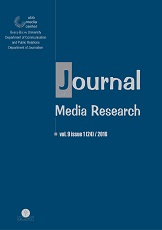Intergenerational Digital Storytelling Pairing Teens as Multimedia Facilitators with an Elder as Narrative Director
Intergenerational Digital Storytelling Pairing Teens as Multimedia Facilitators with an Elder as Narrative Director
Author(s): Margarida RomeroSubject(s): Social Sciences, Education, Communication studies, Theory of Communication, Adult Education, Educational Psychology
Published by: Accent Publisher
Keywords: Intergenerational learning; digital storytelling; elders; ICT; secondary education
Summary/Abstract: Intergenerational communication and learning empowers different generations valuing their knowledge (Ivan & Fernández-Ardèvol, 2014; Newman & Hatton-Yeo, 2008). Traditionally, elders have been recognized by their wisdom and were given a responsibility in the transmission of the cultural heritage to younger generations (Stiegelbauer, 1996; Weinstein-Shr & Henkin, 1991). Scientific and technological knowledge in the Information society has relegated elders as knowledge authorities; moreover, younger generations often refuse elders’ knowledge (Cattell, 1994; Weinstein-Shr & Henkin, 1991). Internet, peers, teachers and parents have become the leading knowledge sources for the youngest generations. Our project aims to value elders’ knowledge by inviting them to share their life narratives related to the social sciences curriculum. In line with this goal, we invited an elder to share her immigration life experience with a group of secondary-level teenagers studying the topic of migration. This topic is part of the social sciences curriculum (PFÉQ, Gouvernement du Québec, 2011). The intergenerational learning activity was designed to promote intergenerational learning and value not only the knowledge of elders but also the teens’ knowledge of multimedia through the creation of a digital Open Educational Ressource (OER) based on the elder’s immigration experience narrative. Both the elder and teens (n=8) participating in the experience provided evidences of their intergenerationnal learning in a semi-directed discussion following the experience. More importantly, both type of participants felt empowered and valued through the intergenerationnal digital storytelling activity.
Journal: Journal of Media Research - Revista de Studii Media
- Issue Year: 9/2016
- Issue No: 24
- Page Range: 14-27
- Page Count: 14
- Language: English
- Content File-PDF

